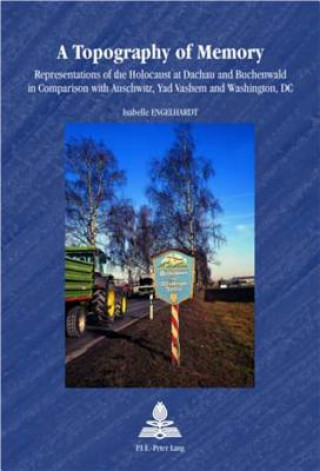
Kód: 10028812
Topography of Memory
Autor Isabelle Engelhardt
There is a paradox inherent in any attempt to memorialize the Holocaust. On the one hand, it can be argued that the Holocaust is fundamentally unrepresentable, indeed unimaginable, and that no human means of communication can adeq ... celý popis
- Jazyk:
 Angličtina
Angličtina - Vazba: Brožovaná
- Počet stran: 237
Nakladatelství: European Interuniversity Press, 2002
- Více informací o knize

1621 Kč
Dostupnost:
50 % šance Máme informaci, že by titul mohl být dostupný. Na základě vaší objednávky se ho pokusíme do 6 týdnů zajistit.
Máme informaci, že by titul mohl být dostupný. Na základě vaší objednávky se ho pokusíme do 6 týdnů zajistit.Prohledáme celý svět
Mohlo by se vám také líbit
Dárkový poukaz: Radost zaručena
- Darujte poukaz v libovolné hodnotě a my se postaráme o zbytek.
- Poukaz se vztahuje na celou naši nabídku.
- Elektronický poukaz vytisknete z e-mailu a můžete ihned darovat.
- Platnost poukazu je 12 měsíců od data vystavení.
Informovat o naskladnění knihy
Zadejte do formuláře e-mailovou adresu a jakmile knihu naskladníme, zašleme vám o tom zprávu. Pohlídáme vše za vás.
Více informací o knize Topography of Memory
Nákupem získáte 162 bodů
 Anotace knihy
Anotace knihy
There is a paradox inherent in any attempt to memorialize the Holocaust. On the one hand, it can be argued that the Holocaust is fundamentally unrepresentable, indeed unimaginable, and that no human means of communication can adequately convey its enormity. On the other hand, any memorial devoted to the Holocaust is predicated on the notion that the only way to ensure that such a thing does not happen again is to bear witness and thereby «bring the living and the dead together». But how can something that cannot be represented be remembered or witnessed? This book is an analysis of the history of various sorts of representation, chiefly memorials, on the site of the concentration camps Dachau and Buchenwald in comparison with Auschwitz, Yad Vashem and the US Holocaust Memorial Museum in Washington, DC. By providing a reconstruction of the history and debates surrounding the question of memorializing and forgetting, it interrogates the question of how to represent the unrepresentable. It is a study of how the boundaries of representation and the rhetoric of artifacts changed during the transformation of these places. It draws on Freudian analysis, the literature on sites of memory, and the debate about writing about the Holocaust, showing clearly how the camps have been and still remain highly contested places of memory and arguing that these debates and their physical embodiment on the sites have to be incorporated in our understanding of what these places represent.
 Parametry knihy
Parametry knihy
Zařazení knihy Knihy v angličtině Humanities History History: specific events & topics
1621 Kč
- Plný název: Topography of Memory
- Podnázev: Representations of the Holocaust at Dachau and Buchenwald in Comparison with Auschwitz, Yad Vashem and Washington, DC
- Autor: Isabelle Engelhardt
- Jazyk:
 Angličtina
Angličtina - Vazba: Brožovaná
- Počet stran: 237
- EAN: 9789052019574
- ISBN: 9789052019574
- ID: 10028812
- Nakladatelství: European Interuniversity Press
- Hmotnost: 390 g
- Rozměry: 153 × 221 × 17 mm
- Datum vydání: 16. January 2002
Oblíbené z jiného soudku
-

Man's Search for Meaning
180 Kč -

Women, Race & Class
276 Kč -

Pianist
211 Kč -

Out Of Place
303 Kč -

Little History of Economics
351 Kč -

Laughter in Ancient Rome
501 Kč -

Civilization and Capitalism, 15th-18th Century
1611 Kč -

Armies of Medieval Burgundy 1364-1477
395 Kč -

Night
250 Kč -

Society of the Spectacle
291 Kč -

Imperialism: The Highest Stage of Capitalism
185 Kč -

Man's Search For Meaning
410 Kč -

Homo Deus
265 Kč -

Ordinary Men
306 Kč -

Black Earth
358 Kč -

The Complete MAUS
462 Kč -

The Rape of Nanking
441 Kč -

Madness and Civilization
419 Kč -

Conquerors
306 Kč -

Stoned
276 Kč -

Twelve Years a Slave
90 Kč -

At Home
303 Kč -

Origins of Museums
1343 Kč -

Measure of a Man
261 Kč -

Delirious New York
679 Kč -

Eichmann in Jerusalem
306 Kč -

Mein Kampf - The Ford Translation
986 Kč -

Bloodlands
358 Kč -

Guns, Germs and Steel
358 Kč -

Cold War Submarines
865 Kč -

Fall of Public Man
410 Kč -

Che Guevara
552 Kč -

Dancing In The Streets
303 Kč -

Fix the Pumps
351 Kč -

Blue
954 Kč -

Revolutionary Yiddishland
336 Kč -

Commandant Of Auschwitz
303 Kč -

Jewish State
277 Kč -

Eichmann in Jerusalem
357 Kč -

Reflections on the Revolution in France
250 Kč -

Wall Street and the Bolshevik Revolution
357 Kč -

Corgi Toys
407 Kč -

Night
276 Kč -

Wreck of the Titan
306 Kč -

McMafia
303 Kč -

Intimate History of Humanity
357 Kč -

Feminism: A Very Short Introduction
250 Kč -

White Gold
357 Kč -

Twelve Who Ruled
600 Kč
Osobní odběr Praha, Brno a 12903 dalších
Copyright ©2008-24 nejlevnejsi-knihy.cz Všechna práva vyhrazenaSoukromíCookies





 Vrácení do měsíce
Vrácení do měsíce 571 999 099 (8-15.30h)
571 999 099 (8-15.30h)